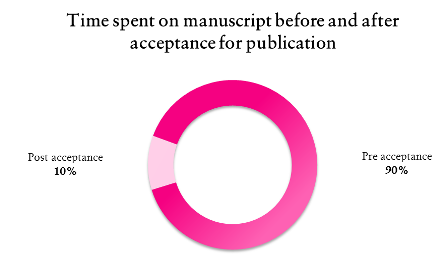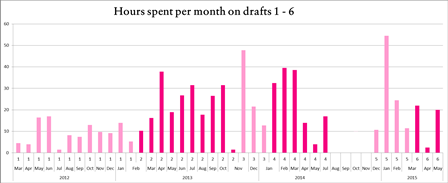
Here’s the short answer: 736.
Well, for mine anyhow, from inception to publication. At 77,270 words, that’s a little under 105 words per hour. Ouch, I hadn’t thought of it that way. What was I doing, using my toes to type? Sadly not.
Here’s the longer answer.
***
When I finished the first draft of my novel, I remember leaning back in my chair, feeling rather pleased with myself, and thinking, “One quick run through, little bit of a polish up, fix the typos, then get it straight out to some agents.”
I’d probably watched Misery the day before or something. If there’d been a bottle of champagne in the fridge, I’d have got drunk and started wondering where I could buy a Cuban cigar at one in the morning.
This level of naiveté was probably just as well. If I had known how long it would actually take, I wonder if I ever would have started the thing. So with that in mind, if you are an aspiring writer wondering how long it might take to write your first novel: read on at your peril.
Do you really want to know how many hours of labour it’s going to take?
OK, so you’re reading on. Good. I do, after all, want people to read this. Otherwise, I would have just left all the copiously recorded stats where they were, on the spreadsheet I filled in at the end of every sitting, deep into the night.
I’m a bit of a geek, being a computer programmer by trade and a statistician by training. Which is why I so religiously filled in my worklog, as I call it. This means that I can now see exactly how many versions (drafts) my book has been through en route to publication, how long each one took, and what I was focussing on each time round.
So here goes…
Version 1.0 | 135 hrs | Inspiration
I loved the first draft. Writing it, that is. I didn’t enjoy reading it so much. Shame that, but it’s quite normal, I hear. Basically it wasn’t that good.
But why would it be? A finished novel isn’t a flow of zen-like inspiration. It’s more like how Edison described genius: 1% inspiration and 99% perspiration. Often without the genius.
I had already perspired a fair bit, but the ratios were nowhere near 1:99. Not yet.
Version 2.0 | 211 hrs | Perspiration (and characterisation)
v2.0 was a pain. It ended up as a complete rewrite, which you can see by the time it took. Almost double the time spent on v1.0. I realised that my main character (Mario Gunzabo, once Greece’s top detective, now one-armed tennis coach living in Worthing) wasn’t fleshed out sufficiently. I just didn’t know him well enough.
In v2.0, I fixed this, and Gunzabo now had a distinct personality, and reasons for his fall from grace and partiality to booze. But this affected everything. It changed what he said, how he said it, how he acted, how he reacted, and therefore how everyone else reacted to him. This changed the book entirely. It made many scenes redundant, meant every conversation, even if it started the same as the first draft (I mean version), flowed in a different direction.
But it had to be done, and the book was much better for it. It still wasn’t finished though, of course.
Version 3.0 | 82 hrs | Amplification
Before I started Version 3, I had done about as much as I could. Or so I thought. What in fact I had done, was as much as I could do on my own. I needed feedback. I’d had a bit following my first attempt, which had corroborated my own suspicions about the book: “great idea, lots of potential... could be better.”
This was exactly the same feedback I had from v2.0. However, rather than friends reading the first few chapters, I sent it to an editorial consultancy, the Writers' Workshop. (Other consultancies are available, they’re not paying me to mention them, though they are more than welcome to do so.) In other words I paid for a professional opinion. And I got a very useful, well-considered, professional’s opinion on the book.
Was it worth the money? Well, yes - with some reservations. But that’s another story, which will be a soon-to-come post. What is certain, is that I got some very good pointers as to how I could improve the book, which can be boiled down to one word: amplification.
I needed to fill out the main themes, the supporting characters, the plot itself. The book - Dead Star Island - is a murder mystery. But it was too mysterious. I was expecting too much of my readers. So I addressed all these things in v3.0. This brought me just past the halfway mark. Fortunately, I still didn’t know that.
v4.0 | 131 hrs | Emotion
v4.0 was all about feeling. It came as a result of giving the book to a friend of mine, Frank, who is a retired English Literature teacher. asked him because he’s clever, very well read, but above all, highly opinionated and not afraid to express it. Neither is he lavish with praise. So if he liked it, it meant he really did like it. And I didn’t have to pay him. That was a pretty big reason.
I remember sitting in his living room. He was holding the report he’d written on the book. He gave me a can of beer which he waited for me to finish, then he handed over the report and watched me read. It broke my heart. He didn’t offer a grade, but it felt like a D. A few passages were quite good, he said. Good idea too. Then there were the buts... Eventually I uncurled myself from my foetal position, went home, swore a lot and drank a bottle of wine with my wife. Very quickly. Two days later I read his report again. There were many useful observations, but one key point resonated above all: “where’s the emotion?”
What can I say? I’m a bloke. And a computer programmer. I categorise each draft of my novel using versioning, like Microsoft Windows or something. Emotion doesn’t come easy. Actually that’s not true. I just expect people to understand without saying much. Socially, I’m a man of few words. That doesn’t always work in a writer though. Funny that. It took 77,270 words, rewritten three times, to work that one out.
What I’d been doing was expecting too much of my readers again. So I spent most of the 141 hours of this draft bringing out the feeling, making it deeper, more visceral. That’s a big reason why we read, isn’t it? To feel. Experience what we may never feel in our day to day lives. Or perhaps to validate what we do feel by experiencing it also through others on the page. Maybe. Something like that anyhow. I am a computer loving bloke, after all.
v5.0 | 101 hrs | Butchery
This was a tough one. It was the one where you end up killing your darlings. Some of them anyway. I was pretty dejected. No joy with the agents. I’d wasted almost 6 months waiting for a series of polite emails, all saying no.
A friend of mine, a successful writer, had a look at the first few chapters (Simon Lelic, you should read any of his books. His first, Rupture, is my favourite). His pronouncement boiled down to this: great idea, the writing’s good... book could be better though.
What? Talk about déjà vu. But he had some practical advice: chop chapter one, chop out one of your supporting characters. Oh and read Solutions For Writers by Sol Stein. So I did all these things. By the way, I recommend this book to any writer, aspiring or perspiring. The first chapter alone is worth the cover price (on opening chapters; within two pages I knew what was wrong with mine).
So, I regrouped, swung the meat cleaver and lopped off whole chapters, trying not to think about how many hours I’d revised, tweaked and polished every sentence. Then I decided to try some independent publishers, picked one, got asked for the whole manuscript, got told they loved it and got a book deal. Simple as that.
Draft 6 | 76 hours | Punctuation
It was the home straight. I’d finally got down to agonising over punctuation, words, meaning, short phrases, whether we might get sued, that kind of thing. Reading through the damn thing several times over, yet again. Definitely no inspiration there at all. I remember struggling with a particular phrase that the proof reader had judged not the sort of thing an American would say. I spent an hour dithering over its replacement. It was time for a new book. Time for that precious one percent. I reckoned I’d earned it.
***
So that’s where the 736 hours came from. Here are the stats behind them.
The Stats
I sort of hinted at some stats somewhere near the start of this post, didn’t I? If you skipped the text to the pretty pictures at the end, I won’t hold it against you.

You can see I spent a lot more time on subsequent drafts than the first one. Maybe I should have done a bit more planning…

The majority of my work was done before the manuscript was accepted for publication.

Alternate colours indicate different drafts. As you can see, draft 1 took a year, at which point I started getting a bit more serious. The gap is the time I spent waiting for responses to submissions to agents.
One last thing
If you yourself are a programmer, or that way inclined, you may have thought, I’d have used v1.0, v1.1, v1.2... Or v0.1, v0.2… v1.11, v1.12… Well I did. What I describe above are major versions. And I approached backups with the same level of paranoia that I do my day job: versioning, retention, on site, off site. Also known as Dropbox. Other backup clients are available. They’re not paying me either, unfortunately.
Andrew Shantos always knew he wanted to write, but he didn't have an idea for a book. After scraping through his Maths degree by the skin of a Rizla, he helped his father launch Highway Electrical News, a magazine about street lighting which nearly featured as the guest publication on Have I Got News For You. In his twenties, Andrew left a number of bands due to artistic differences.
Finally, three years ago, on a beach in Cyprus, Andy was thrilled to finally come up with an idea that combined his love of music, dead rock stars and ferrets, though his wife claims the idea was actually hers. They live in Brighton, UK, with their two small children and have almost settled the argument. Find out more about his debut novel here.
Comments